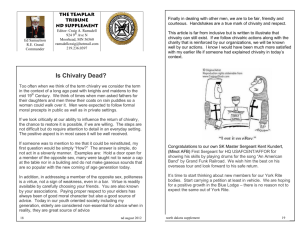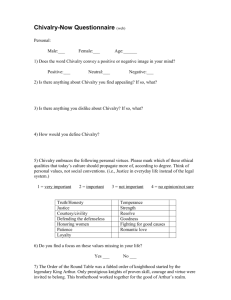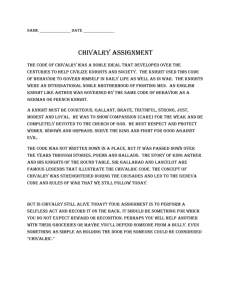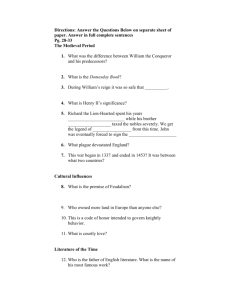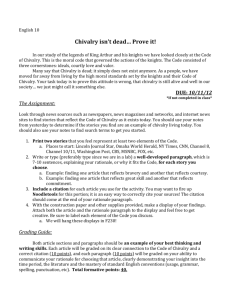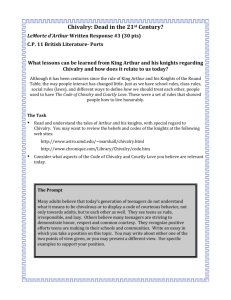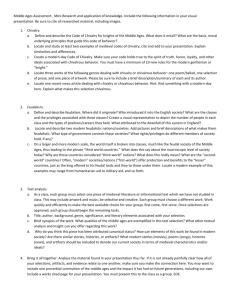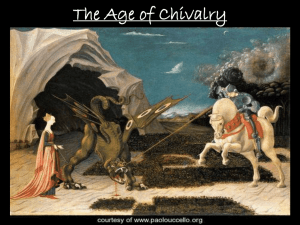The Higher Chivalry and Mission of the
advertisement
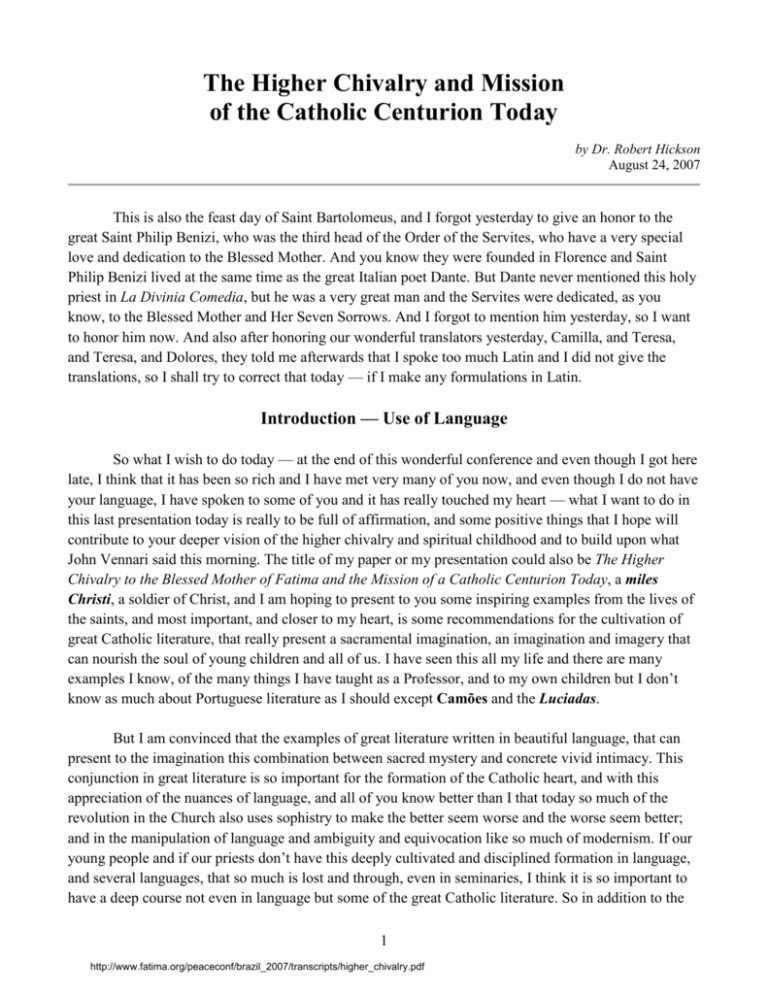
The Higher Chivalry and Mission of the Catholic Centurion Today by Dr. Robert Hickson August 24, 2007 This is also the feast day of Saint Bartolomeus, and I forgot yesterday to give an honor to the great Saint Philip Benizi, who was the third head of the Order of the Servites, who have a very special love and dedication to the Blessed Mother. And you know they were founded in Florence and Saint Philip Benizi lived at the same time as the great Italian poet Dante. But Dante never mentioned this holy priest in La Divinia Comedia, but he was a very great man and the Servites were dedicated, as you know, to the Blessed Mother and Her Seven Sorrows. And I forgot to mention him yesterday, so I want to honor him now. And also after honoring our wonderful translators yesterday, Camilla, and Teresa, and Teresa, and Dolores, they told me afterwards that I spoke too much Latin and I did not give the translations, so I shall try to correct that today — if I make any formulations in Latin. Introduction — Use of Language So what I wish to do today — at the end of this wonderful conference and even though I got here late, I think that it has been so rich and I have met very many of you now, and even though I do not have your language, I have spoken to some of you and it has really touched my heart — what I want to do in this last presentation today is really to be full of affirmation, and some positive things that I hope will contribute to your deeper vision of the higher chivalry and spiritual childhood and to build upon what John Vennari said this morning. The title of my paper or my presentation could also be The Higher Chivalry to the Blessed Mother of Fatima and the Mission of a Catholic Centurion Today, a miles Christi, a soldier of Christ, and I am hoping to present to you some inspiring examples from the lives of the saints, and most important, and closer to my heart, is some recommendations for the cultivation of great Catholic literature, that really present a sacramental imagination, an imagination and imagery that can nourish the soul of young children and all of us. I have seen this all my life and there are many examples I know, of the many things I have taught as a Professor, and to my own children but I don’t know as much about Portuguese literature as I should except Camões and the Luciadas. But I am convinced that the examples of great literature written in beautiful language, that can present to the imagination this combination between sacred mystery and concrete vivid intimacy. This conjunction in great literature is so important for the formation of the Catholic heart, and with this appreciation of the nuances of language, and all of you know better than I that today so much of the revolution in the Church also uses sophistry to make the better seem worse and the worse seem better; and in the manipulation of language and ambiguity and equivocation like so much of modernism. If our young people and if our priests don’t have this deeply cultivated and disciplined formation in language, and several languages, that so much is lost and through, even in seminaries, I think it is so important to have a deep course not even in language but some of the great Catholic literature. So in addition to the 1 http://www.fatima.org/peaceconf/brazil_2007/transcripts/higher_chivalry.pdf lives of the Saints, some of which really express the Christian chivalry and they live it, and this is not an illusion, this is not a fantasy and the same way with great literature that can also prepare the hearts for understanding what it really means to be called to the higher chivalry, with generosity and humility, and to grow up in the spiritual childhood. Relation to “Understanding and Combatting the Growing Forms of Total War” So I wanted to remind you that before I go on, of how this fits in with my talk from yesterday. I tried to emphasize at the beginning the mystery about Our Lord’s relationship with the centurion, where he had wonder mirandum at the faith of this centurion. But also there is the Saint, Longinus, the name of the centurion who pierced the heart of Our Lord, and if you go into Saint Peter’s in Rome, you know there is a beautiful statue there of Saint Longinus — there used to be anyway I don’t know if it is still there. And also the third centurion in the New Testament is Cornelius, where Saint Peter brought him into the Faith with his whole family, and I think — I have often meditated on this — the relationship to these three centurions, and even though a centurion — from centurio — was a Roman officer maybe in charge of a hundred men, that it’s a symbol for us also between the priest and the soldier. And how do we think today of the miles Christi in the current context of irregular warfare; in the current context of very grave forms of growing total war. Yesterday I talked about biological warfare, I did not tell you some things, maybe it would not be wise, but I also want you to know that other kinds of weapons that are in development some of them are in effect, they could lead to what you Catholic priests and dear bishops know as the Four Horsemen of the Apocalypse: about war, conquest, famine, and pestilence. A couple of years ago when I was giving some lectures in Austria and in Switzerland, there was a German man who came up to me from the Bundesnachrichtendienst, that is, the German intelligence service like CIA. And he wanted to speak with me openly, and I can just tell you the following, to give you an example: He said: “Professor Hickson, can you tell me, do you know very much about seismic weapons?” Seismic weapons — from the word seismic — they can create earthquakes. And he said to me, “We have been watching some very strange phenomena in Turkey, and we know some of the weapons that the Russians have but do you know any of this?” I could not talk to him openly about what I know but I listened to him. And he said to me also, “Sir, do you know which city in the world is most vulnerable to earthquakes?” And I said, “No,” and he said, “Tokyo, Japan.” He said, “It sits right on a series of geological faults, it would not take very much of a vibration weapon to destroy millions of people.” So it’s very sobering, and also as you probably know there are weapons that can manipulate weather. And of course a lot of these kinds of weapons can call for international solutions, you know global government solutions. So when I am talking about some of these weapons, seismic or weather weapons that can manipulate or modify weather, it can have long range effects on other countries. So we are talking about things that we have to prepare [for] — not only ourselves but our beloved children and others; that this might be in our future, in the mysterious, permissive will of God. 2 http://www.fatima.org/peaceconf/brazil_2007/transcripts/higher_chivalry.pdf It is very hard to set limits to this and we are going to have to endure some of these things with as much nobility and generous chivalry and sacrifice as possible. So when I talk, and just a couple more things about yesterday, about setting limits, ‘Understanding and Combating the Growing Forms of Total War’. And I gave you many examples, but this trying to set limits is part of our moral obligation and how do we set limits, and those who were talking to me this morning that wanted to be military chaplains. What a wonderful contribution if you have a calling to be a military chaplain today, to help be a moral conscience in the military. Because what I see in my own country and European countries: Who is the effective moral conscience in the military? — Lawyers! Lawyers! Lawyers are involved in everything — the selection of targets and the priests are marginalized; and I think a priest can make a wonderful contribution for the greater bonum commune, the greater common good, if he were involved in this. And as a lot of you know, there is a whole class of weapons today that is being developed that is called “non-lethal” weapons. Be careful when you hear that word: check and see if your wallet is still there and your money, because under the cover of non-lethal weapons, there are developments that are very grave. And I know some people that said, “I would rather be dead than be affected by this”. So, under the guise of the development of non-lethal weapons, and various other aspects of what we call psycho-tropic and neuro-tropic weapons, not only bio-toxins that can alter the mind and the neurology, that can affect your neurological system — imagine this! And then I am going to move on to the positive things. Can you imagine that there exists certain kind of agents that help boost your immune system, you know, an adjuvant, but then cause your immune system to react on each other, on itself. They are called “autoimmune diseases,” some of you know, like MS (multiple sclerosis). There are whole classes of diseases today that are coming — even for young children — that are autoimmune diseases. And some people have gotten problems by taking vaccines, that they boost the immune system but then it can boomerang, it can bounce back and there are people, and I can’t go into more details, but just imagine again the consequences of the revolution of molecular biology and genetic engineering. So we are talking about things, not to dramatize it like Hollywood, but these things are part of research, and think about the matter of setting limits. And once again those who are courageous and have the spirit of love of Our Lady and Her purity and the care for the children, you are going to want to anticipate and set limits before it is too late. Before we cross across a threshold like in the photo-electric effect, it’s too late to come back. So that’s what I was doing yesterday, to try to say that a priest and a soldier need not, should not be divorced and both of us have a very great attentiveness to the vulnerable, not only to the women and the purity of a woman, but to the little children, and that defense. So once again the motto of both of my talks is, “Blessed be he who has saved the child’s heart from despair” as Our Blessed Mother would want to do also. Three Subtle Tactics in Modern Warfare And the other thing is that in this kind of modern warfare, I just want to add a couple of more things. I think it’s very important. There is so much increased sophistication of the capacities of 3 http://www.fatima.org/peaceconf/brazil_2007/transcripts/higher_chivalry.pdf deception, and years ago when I was a young cadet at West Point, I was on loan with a British SAS, their elite special air service, and a Captain said to me in idiomatic English, “Hickson, do you know the principle of deception?” And I said, “No sir.” “Oh it’s very simple, you find out what somebody wants to be deceived in and then you promptly set about deceiving him in it, and sometimes more slowly.” So this was a profound statement I never forgot. I was only 18 years of age. And later on I saw the meaning of it, because he related the principle of deception to self-deception. In other words we manipulate your self-deception, we find out what you really want to believe, even about yourself, and we’ll profile you and manipulate. These capacities have really increased. The second thing I would say is what I called years ago — and this is the moral difficulty for us — the judo principle. Some of you who know Japanese, or you know judo or ju-jitsu (in Chinese), judo in Japanese means gentleness, but it’s a deceitful, a deceptive form of gentleness. You use someone’s strength against them, and in a deeper moral sense, you use someone’s virtues against them, so you exploit his virtues. And in modern irregular warfare this is why the greater discipline and faith must be there, because very often your strengths, your mercy, your forgiveness can be used against you. And you have to have a special integrity. And the third thing that I would bring up in this context and then move on, because it’s connected with this cultivation of language and literature, is what I call the sophistic phenomenon. You know the ancient philosopher like Plato combated sophistry all his life. Sophistry is a recurrent temptation of the human mind, and sophistry is a two-fold corruption, sophistry, a sophist will corrupt your relationship to reality and he will corrupt the communication of reality to someone else. So he will corrupt your relationship to the real extra mentum reality outside of the mind, and he will also corrupt your communication of the truth to others. The truth is not only a confirmation of the intellect to reality, but it is also, as Saint Thomas Aquinas said, the veritas rerum — the manifestation of reality to a knowing mind. And sophistry always tries to corrupt that, and you remember Gorgias from the ancient world, one of the Sophists that Plato combated, he would argue very sophistically to show the better is the worse, and the worse is the better, that truth does not exist. Or if it did exist, you could not know it, or if you knew it you could not communicate it to anyone else — it’s very famous. It doesn’t exist but if it did exist, you couldn’t come to know it, and even if you did come to know it, then you couldn’t communicate it to another. You’re all alone. He was very seductive, and Plato constantly combated this sophistry. And in my judgment, living as I do in certain areas, I see this growing more and more, you know, to live is to manipulate, and once again, when you have the lie, and deception, and sophistry, it so easily breaks trust and leads you to cynicism or worse, you give up, you get cynical or you kind of despair, not supernaturally but you give up. Being Catholic in the Military So I think it is very important in this context to say what is this whole tradition of chivalry which was the Christianization of military warfare? And if you know the longer history of how hard the Church worked in late antiquity, in the middle ages, to build this. So you had this code of honor that set limits to the terrible passions of man. And this still is an abiding tradition. I can tell you from serving 4 http://www.fatima.org/peaceconf/brazil_2007/transcripts/higher_chivalry.pdf with many foreign militaries, and knowing several foreign militaries, there are wonderful Catholic officers that I know in France, two of them are now retired as generals, François Legriere, twelve children, François Danselle, retired general and several people I know in the French Foreign Legion where some of the best Catholics go. These are men of prayer. They pray with their troops, and when he was Colonel Legriere in the Balkans, he would pray the Rosary every day with his troops. There are few of those in my military. It’s much harder to be a public Catholic, you know, with your men, you can do it more privately, but in a lot of the military, I knew some of them in Argentina years ago, and I know Mohammed Sen Aldine, he is a controversial figure, he originally was from a Druze family from Lebanon, very strict — but he was very Catholic for many years. His paratroopers loved him, and he would always kneel and pray the Rosary with them. He really loves Our Lady you know, and a lot of these people exist, I know them, I have met them, including in the German army. So I think, and also I wanted to say that I told a couple of you the priests, when I was in Spain I used to go there more frequently in1974 and -5, I worked very closely with the Carlistas and the Requetés, because they were very worried that when Franco died there was going to be a new civil war. And I was in San Lorenzo de El Escorial, the Universidad Maria Cristina, and a lot of the nuns there remembered even, how nuns were raped and killed during the Spanish Civil War, the Guadarrama Mountains there, and they were really nervous. So we had some training in a Trappist Monastery in Navarra and preparation just in case, but it turned out that there was never violence; there was a kind of subversion and Juan Carlos came in and the masons had their own special plan. But I saw a lot of these wonderful men who were Carlistas, and some of you know they gave me a Detente — as if I were one of their sons — that they wore in combat — the Corazón Jesús. And [in] their sons you could see this living tradition of chivalry. And there is a man that I know named Miguel Ayuso Torres, he usually goes by Miguel Ayuso, he writes for Verbo magazine, the Spero group, wonderful officer, he is also a Professor, he once said to me years ago, “Robert, the soul of Spain is the incarnation of Christian chivalry”. I never forgot that. It’s also been part of my ideal, and he understood too, very well, about the meaning of chivalry and the protection of the vulnerable — but you need to be vigilant and virtuous, but to grow up in the spiritual childhood. And what I am saying without going into some things that I know from Portugal, and Father[s] Roque Cabral, Jean Cabral and Father Nogueras up in Braga — these were deeply faithful Jesuits — not modernists — with a spirit of chivalry and joy that was a great edification to me. I was there with them for a long time in 1978 and these were men who understood from Saint Paul’s first letter to the Corinthians, where Saint Paul brings together Caritas and Veritas, he brings together charity and truth. And he says, Caritas congaudet [autem] veritati, “True charity takes joy in the truth”. And I remember speaking with some of these great priests who had been all over the world with the Church, in Goa, Portuguese Macao where I used to visit and Cape Verde Islands, Mozambique, Angola, Brazil and they were specialists in the formation of young men. And they told me at the time the greatest thing they feared was the defection of the women. They were growing in impurity and luring the men away who wanted to have a deeper discipline. They were really men of chivalry, and I remember showing them a note — I was reading in Saint Augustine at the time — there was a great 5 http://www.fatima.org/peaceconf/brazil_2007/transcripts/higher_chivalry.pdf phrase in Latin from Saint Augustine called gaudium de veritate, the interior joy that comes from the truth. And when I saw these priests — these were Jesuits (that was really a military organization as Saint Ignatius was also a soldier, and we are in his building today) — but these were men of chivalry, and they were forming young men to this higher calling. So, the first thing I would like in this part here as we are linking together, the parvuli of Christ, the little ones, and these matters, is think of not only somebody like Saint Philip Benizi that we were talking about, but some of you know, and I know — there is a wonderful Cistercian priest here — you all know of Saint Bernard of Clairvaux. Has anybody here read his wonderful piece, this is the 12th century, De Laude Novae Militiae, now Militia, you know, as Job said, Militia est vita hominis super terram ‘Warfare is the nature of man’s life upon the earth,’ but in the medieval Latin and in Saint Bernard De Laude Novae Militiae [“In Praise of the New Chivalry”], and you remember he wrote a rule at the beginning — before they went corrupt — of the Knights Templar, and it was a Cistercian order, you know that Father, this was a Cistercian rule, and what he was doing was preparing a rule of chivalry for these monks who had a religious vocation to the bearing of arms to protect the pilgrims and going to the Middle East. We won’t talk about their later corruption, but what I am saying is, in Saint Bernard too, in the 12th century, you had this high spirit, it was especially in the early Cistercians, they had a great influence on later western literature and life. The Higher Chivalry — Sacrificing for Jesus and Mary And at the same time you know, and this is the same century, in 1170 Saint Thomas à Beckett was martyred. As some of you know I was born on his feast day, on the 29th of December and I have always felt a very deep bond to Saint Thomas à Beckett of Canterbury. And some of you who are priests might be interested to know this little fact: That originally the 29th of December was the Feast of the Holy Innocents, and in the Eastern Church for years, but after the Latin Church canonized Saint Thomas à Beckett, it was moved back to the 28th. That is what the British call “Childermas”. So in addition to King David the Psalmist and Saint Thomas à Beckett, it was once the feast day of the Holy Innocents. And you remember the great Christian poet Prudentius that called the Holy Innocents the flores martyrum, the flowers of the martyrs — the flowers that came before the fruits of martyrdom, you know. He has some beautiful poetry. So when we talk about some of these, as we go in, I want to move into some of the important literature. A man who means a lot to some of us in the room especially one of my former students here that has given some talks to you, the great Saint Edmund Campion who died a terrible death on the 1st of December 1581, under Queen Elizabeth. He was the proto-martyr I mentioned yesterday, a Jesuit in Elizabethan England in the 16th century. Under the Catholics, and it is similar to today, more and more the Catholics who lived under Queen Elizabeth and her growing police state — as Evelyn Waugh said about them — more and more the Catholics only had three choices really: apostasy, conspiracy or 6 http://www.fatima.org/peaceconf/brazil_2007/transcripts/higher_chivalry.pdf sacrifice. And many people in England that didn’t have apostasy, they joined some various underground movements to try to overthrow the government, which was imprudent because they weren’t strong enough, and a lot of them got killed. But as Evelyn Waugh said but Saint Edmund Campion showed us, we love him so much, because he showed us the way of sacrifice. What Father Gruner has been saying today — as well as John Vennari this morning — and if you know anything about Saint Edmund Campion, a very great man, what Waugh said, and if you read Campion’s writings, because he was a very gifted literary saint, he expressed so well the spirit of chivalry in which he suffered, he and his fellow Jesuits, and it’s a great inspiration, so not only do we have — if you read some of these saints which I have often, there are some very fine saints lives, and I know a lot of you have these things for your spiritual life, but in light of this chivalry of Our Lady, because what I am pointing to in this my whole talk is the higher chivalry today, is that special love of Our Lady, Our Lady of Fatima, and I have been finding out more about Nuestra Señora de Luján but to live this in this orientation, building on this long articulate tradition of Christian chivalry. And there is a great literature in several languages of this tradition of this tradition of Christian chivalry. I have some examples on the outline I made, I am going to comment on a couple of them. And even though some of them might not emphasize this deeper chivalry and the special code of honor and protection and dedication and prayer and humility and this generosity, that is the emphasis, and no matter what the suffering is, it’s this response of generosity. What did our dear Lord say? “I came that they might have life, and have it more abundantly.” “More abundantly.” The Latin word is abundantius, overflowingly, and that is what we are called to — this more abundant life, and as the Dominicans say gratia is gloria incepta, gloria is gratia perfecta: grace is glory begun, glory is grace perfected. And we are to live and die supernaturally alive in sanctifying grace, and the great literature of chivalry is so attentive to this. I mean these matters of prayer and manliness and magnanimity, this great soul spirit as well as humility. And there are so many examples of Catholic literature. The Importance of Chivalric Literature in Education But here we come to a paradox, and I have seen this for many years, there tends to be — certainly in the people I know in the intellectual circles — a trivialization of literature: ‘Oh well you know this is just imagination and feelings.’ I think it’s a very serious misunderstanding. A lot of you know from reading the lives of the saints, especially the literary saints, who wrote very well in documents not just like Saint François de Sales or something, but they said, “What was the hardest thing that (they) had to mortify?” Their imagination! Right? To mortify the imagination when you have danger and temptation, these allurements, so it’s so important for the education of children, is this wellformed imagination; you know, filled with images of beauty, in these narratives and through characters. And there is something very mysterious about the imagination as Saint Thomas says — St. Thomas Aquinas — it’s not a cognitive faculty but it is very easy to lead you astray, as in the temptations of the demonic realm or the world, the flesh and devil in general. So how important this 7 http://www.fatima.org/peaceconf/brazil_2007/transcripts/higher_chivalry.pdf kind of sacramental imagination is, that can bring, that can give mediation and form and proportion to the Sacred Mysteries of our Faith, the analogies of the Faith, like in the parables of Our Lord, but in these moving narratives. And there is so much great literature that I’m trying in several places in the United States and in Europe, to encourage even the seminaries to have some very important courses, not just in Greek and Latin, and studying the Patres, you know — and many of them were very formed by literature — the Greek and Latin Fathers, but really have some courses to deepen them and having this beauty. Chivalry — in Italian Literature: I promessi sposi I mean, some of you probably have heard, I was talking to Alessandro or Alex, the other day of I promessi sposi the great Italian novel [by Alessandro Manzoni], sort of, the novel, the historical novel in prose, what the Commedia is of Dante. But most of the Italian children are forced to read it in school and they don’t usually like it. It’s really beautiful, and some of you know Pope John Paul I, he said in his commentary on The Betrothed [“I promessi sposi”] he said the Blessed Mother and a choir of virgins could read this without blushing in shame. Isn’t that a beautiful statement, the Blessed Mother and a choir of virgins could read this and yet it takes place during the Thirty Years’ War in Northern Italy around Lake Como, and Lecco and Milano, and it deals with war, conquest, famine and pestilence. And you see the temptations of man but you also see, you know, Archbishop Frederico Borromeo, the great Bishop, and how they responded to this. And this work is also a love story, Renzo and Lucia, and it deals with forgiveness — and forgiveness from the heart. It’s beautiful language, if you read Italian; it’s exquisite but it is so beautiful. I mean this is a — here you have a historical novel rooted in actualities, the coming of German troops, and the French, and the coming of pestilence. We might have that in one of our cities. What if, what if there is a spread of smallpox, this infectious virus, which is not anthrax, anthrax is only a bacterium and is not contagious, it can kill you and it has a latency period of three to five days, so that if we were to get affected by it in this tent we would go back and four or five days later it would break out, you know and its serious. But smallpox is even worse, and so maybe what we would have to deal with as priests or as fathers or laymen, how do we deal with something like this, it could come it’s happened before. But when you can read this great literature, I mean historical literature, that is further away, you know, you don’t have the pressure of contemporary events you can be more spacious in your reflection, and some of the things in I promessi sposi really touch your heart, you never forget it. You never forget it. Chivalry — in Austrian Literature: Jesse und Maria I just got done re-reading in German Jesse und Maria, [“Jesse and Maria”]. It was written — a historical novel — written by a very great Austrian woman named Enrica [Freiin von] Handel-Mazzetti. It takes place on the Danube, just after the Thirty Years’ War, in Durnstein where there is a famous statue of the Blessed Mother right on the Danube River where you have the vineyard lands coming 8 http://www.fatima.org/peaceconf/brazil_2007/transcripts/higher_chivalry.pdf down, and it’s a magnificent story, showing the conflict between the Protestants and the Catholics after the Thirty Years’ War — a terrible aftermath of war, like the aftermath of World War I. But it shows you human character, the Catholics — some of the ones who want to accommodate, and then you see Maria who is a beautiful woman, who loves Our Lady, and it’s such an example. So what I’m saying is not only the non-fictional examples of the saints and their writings, but in this great literature the examples that really get inside you. Chivalry — in Spanish Literature: Los cipreses creen en Dios Some of you might have read a book, it’s in Spanish, it’s not really a book of the higher chivalry but its unforgettable, it’s like Solzhenitsyn on a smaller scale. Any of you know the work of José María Gironella, the English title — I can’t pronounce it in Spanish [“Los cipreses creen en Dios”], is The Cypresses Believe in God. The Cypresses Believe in God. Now Gironella later had some problems, but this is a very powerful book. And it’s about the Spanish Civil War, it’s very accurate, in its own references — like Solzhenitsyn — but it deals through a family. The father comes from Andalucia from Sevilla, the mother comes from Novara. It takes place in Catalonia, and one wants to be a priest, so you operate through a family and it makes more intimate all the things that went on, including about the Anarchists. And once again I’ve given this to students, you know, you can’t just read these things in a week, they take more so you have to have a discipline, but these things are profoundly affecting. The same way, you know that, when we talked yesterday about the words of a Roman pagan soldier, except the Church turned two words, “Domine, non sum dignus, ut intres sub tectum meum: sed tantum dic verbo, et sanabitur anima mea.” the Scripture is “puer meus”. Does anybody know who introduced that into the Mass? It was the great chivalric Pope, Pope Saint Pius V, who instituted the Feast of the Holy Rosary, and who had such a sense of what was done at Lepanto. And you think about these things, I mean they come together in your heart when you know some of these matters. Chivalry — in Norwegian Literature: Kristin Lavransdatter So I gave you an example out of Austria, out of Italy, something from Spain that really brings these things home. One of the young men who is here come[s] from a Norwegian family. One of the great converts was a woman named Sigrid Undset, who was a Nobel Prize winner. She wrote magnificent historical novels about Norway and the Faith coming to Norway. And also at the end of one of her great books, a trilogy called Kristin Lavransdatter she shows the response of Kristen, who becomes a nun, she is the mother of eight children, how she responds during the Black Plague, you will never forget it. And this is the kind of thing in beautiful language the description, some of my family is Norwegian, and I have a deeper resonance to some of this. I told some of the priests that a lot of my ancestors were Scandinavian pirates, but it’s not a good heritage probably — but this is beautiful writing. And again when you read this it just seeps into you, like when you meditate and sing the Psalms, you know, again and again. 9 http://www.fatima.org/peaceconf/brazil_2007/transcripts/higher_chivalry.pdf The Higher Chivalry — in German Literature: Parzival There are a couple more that I want to give examples of because I think in this kind of literature, the narration, the character, the nuances of language, there is so much that seeps in that you are not going to get in dealing only propositions. And I think a wonderful combination is teaching literature with a theology, you know, well-formed professor in theology and philosophy and history, so he can give illuminating examples. But really to get into these things and to cultivate what Saint Augustine called the verbum cordes the interior word of the heart. Somebody who is here, Dr. Chojnowski, remembers reading many years ago together, the great German poet, Wolfram von Eschenbach who wrote in middle high German, there are very good translations I know in Portuguese, I found out, of Parzival. Now this is one of the Grail Knights, and it’s so profound the movement of this profound work, where this great knight realizes that the real chivalry and the real loyalty is to be found on Good Friday and at the suffering of Our Lord, that is the inspiration for the higher chivalry. That Sacrifice and Who loves us to the end. And when you read this great literature this is not superficial nonsense, just fluffy feelings, this is really beautiful and the language. Chivalry — in French Literature: Le Voyage du Centurion There was a great author who is actually the grandson of Ernest Renan, the famous apostate in France. His name was Ernest Psichari and unfortunately Ernest Psichari was killed in 1914 at the Battle of Charleroi at the beginning of World War I. Like Captain Charles Péguy who was a beautiful poet, haunting poetry for a Catholic. And he had the higher chivalry. Now Psichari wrote a book called Le Voyage du Centurion, sort of The Journey of the Centurion, about a young officer trying to get away from Masonic France and going to the Sahara — which is like a purifying medium, it’s like an ascetical journey where he discovers not only the deeper meaning of loyalty, he is a French officer, working with Mohammedans, but he comes to realize the profound difference between Islam and Christianity, and the deepening of his own faith. There is a scene in the book where one of the Muslims says, “The ink of the scholars is much more important than the blood of the martyrs” and it’s a turning point for him. And you see in this beautiful work, it’s sort of halfway between prose and poetry, an extraordinary depiction and when you see how he was formed by a kind of a stoic father, you know stoicism is the opposite from Christianity, even though it seems similar in its moral strictness — very different orientation. Chivalry — in Women And this kind of work is especially beautiful, and I have given this to several people including young women. Women can be chivalrous; they can love a priest, with a chivalrous devotion. Or I’ve known students and these women can identify with a man, not in any erotic way but they can have a chivalrous disposition of heart too; a chivalrous devotion. Remember devotion comes from the word val vota and like the ancient soldiers, Roman soldiers, when they were getting ready for battle and the 10 http://www.fatima.org/peaceconf/brazil_2007/transcripts/higher_chivalry.pdf general would have to go Integer! or Inte-gere! in the old pronunciation — “Together!” and they made this meaning of vow, making a promise, in Christianity it’s higher. But these works are, there’s variety, you’ve got cultural differences, and a lot of these things lead to the special love of Our Lady, which is the higher chivalry and to the Blessed Mother and to Our Lady of Fatima, which today under these grave conditions might help us understand the deeper meaning and the mission of a Catholic centurion today. And what are the examples, because we all know that we can be led by priests after an example, but very often, an example, a vivid example, like the parables of Our Lord, these are very good and they stay with you. When you know the parable of the sower, and you know at least in English, it sounds very good, the cultivation of the soil and the cultivation of the soul. And the richer the soil is the faster the weeds grow, so you have to be more vigilant, as Dante shows in The Divine Comedy. Chivalry — in French Literature: Journal d’un curé de campagne There are also, some of you I know have read Georges Bernanos Journal d’un curé de campagne, [“The Diary of a Country Priest”]. The last work he ever wrote too is called Dialogue of the Carmelites, and I’ll tell you a little about that in a minute. But the Journal the book on The Diary of a Country Priest, it is so beautiful, and when you learn how to read, you know that the little Curé of Ambricourt is writing his own diary, and he is so humble he doesn’t know his effect on others. But when you are reading this diary and when you know what happens later on, you know it’s so profound. And Bernanos combined the Curé of Ars — Curé d’Ars, Saint John Vianney and some of the insights of Saint Theresa of Liseaux, the Little Flower. His wife was related to Joan of Arc’s brother, so he had this great sense, and Georges Bernanos was in World War I. But this book, even though it deals with the temptations of despair, he wrote this because he saw like a sensitive tuning fork, those of you who are musicians you know what I mean. Like a sensitive tuning fork of culture. He saw the destruction of the cultural immune system, the destruction of Christendom more and more, and he saw the coming temptation of the sloth — acedia, acedia — and the tentatione the temptation of despair. But this little book is about hope and spiritual childhood, and the link with chivalry, and there is a wonderful scene there between the little priest of Ambricourt and a French Foreign Legionnaire. They ride together on the motorcycle. You’ll never forget it. And what some of the words I put in my outline that Bernanos says; and there’s a wonderful interplay between a younger priest and an older priest. I think you would all be very touched by it if you’ve never read it. And the Curé of Torcy, he is a wonderful robust man, and the Curé of Ambricourt is frail and he is sick, and he has problems from health. And the little, the Curé de Torcy would say, “Do you love the Blessed Mother? She is younger than sin,” and the translators asked me what that meant but in the meaning of Bernanos, Our Lady is younger than sin because She has no sin. And She has this joy and childlikeness and this purity, and the way he conveys it, they also say at one point, “The opposite of a Christian people is the people grown old and sad.” — this tristitia et saeculi. 11 http://www.fatima.org/peaceconf/brazil_2007/transcripts/higher_chivalry.pdf And there is a very famous interplay — I have given it to several priests over the years that didn’t know about it. And they told me they never forgot one of the climactic scenes in the book, where this little priest, who makes himself so small, visits this Countess who is bitter against God. She has lost her baby and she hates God. And he confronts her, and he so affects her that he transforms her. You will never forget the dialogue. And he says, and he says among other things, “Madam, may the hour of mercy not strike in vain. Madam may you not be found standing impenitent under the eyes of Mercy”. He has some unforgettable lines and he says in there, “Joy is a gift of the Church” and he talks about, you know, the joy, and the deeper meaning of joy. You would never forget it. Imagine this, I know priests that have said this to others, “May the hour of mercy not strike in vain”. As Father Gruner was saying, the message of mercy from the Mother of God at Fatima — “May the hour of mercy not strike in vain”. May we not be found standing impenitent under the eyes of Mercy. Now, at the end of Bernanos’ life, it’s a very moving book, and there is really tenderness to it, and Bernanos is a tough man, he knew how to be pretty strong when he wanted to. I know many Frenchmen including a French — well he is actually Hungarian — some of you might have heard of Thomas Molnar, he comes down here, he’s a pretty tough customer, but he reads The Diary of a Country Priest two times every year. It touches his heart that much. You know you are aware of the temptation of despair, what’s going on in the modern world, in the countryside of France, and yet he sees the operation of grace the way it’s coming through. And at the end you find out that when this little priest dies of cancer and consumption, that this book, the diary, is given to his great friend this priest of Torcy. And you realize at the end of the book, my God, how did de Torcy get this book in his hands and see the depth of this little priest who was a saint. And imagine this priest reading it, and the reader, you know, if you know how to read literature, you feel this because you realize with your imagination, my God, imagine de Torcy reading this beautiful book, this intimate diary of this little man, who is so he makes so small that he doesn’t see his effect on everybody. Everybody he touches, he is a channel of grace, but he doesn’t see it. Chivalry — in German Literature: Die Letzte am Schafott There was a famous German woman named Gertrud von le Fort, she died at 102, she was from an old Huguenot family from France. She wrote many beautiful books. Her German is haunting — the prose and the style — she wrote something called Die Letzte am Schafott, which is usually translated into English as The Song at the Scaffold, about the historical Carmelites during the Reign of Terror who were martyred at Compiègne. You will never forget it. And only a woman like Kristin Lavr — like Sigrid Undset or Enrica Handel-Mazzetti only women can have the insights in some of these books. I don’t think a man is capable. And there is a beautiful nun — I’m going to give you just one example — this very magnificent nun in the book who should be the Mother Superior, she has all the talents, the natural talents, but she is the only one that isn’t allowed to bear witness in martyrdom as they go, all these nuns go to the guillotine. And she 12 http://www.fatima.org/peaceconf/brazil_2007/transcripts/higher_chivalry.pdf realizes that God’s will for her is not sacrifice like that, but she must sacrifice sacrifice. Now just imagine, she must sacrifice sacrifice and write the history of these nuns and the youngest nun, Blanche de la Force, who was so afraid she ran away from the Carmel, she is the last one that comes out of the crowd. These were all killed, singing Veni Creator Spiritus. Very powerful. So what does Georges Bernanos do, he was so moved by this book of this German woman, that he wrote, as a man, what he called the Dialogue of the Carmelites. It’s not a novel, Gertrud von le Fort’s little book is a little novel, a novella, but this is a drama by Bernanos and I often gave it to my students. You read a German-Catholic woman and this French-Catholic man and it's wonderful, you counterpoint these. Chivalry — in the English Literature of Evelyn Waugh There are also, there are many others that I could talk [about] — I am trying to give some examples that give you an example. I just gave a long talk up in the United States which is why I was late coming, on a very great man, Evelyn Waugh, who was a convert. He had been a commando, he was a paratrooper and a commando in the British in World War II, and he wrote a very beautiful book in 1935 on Saint Edmund Campion. You will never forget it. It’s non-fiction. The Higher Chivalry — in English Literature: Evelyn Waugh — Sword of Honour But he wrote what’s called a Sword of Honour trilogy, and it took him twelve years to come to his final edition because he was dealing — it was a study of chivalry in the modern world and honor. And even when there is no longer public honor, like in World War II when we made an arrangement with the Soviet Union, and Britain declared war on Finland. Finland was being slaughtered by the Sovietskis. Britain declared war on Finland one day before the Japanese with our knowledge bombed Pearl Harbor in 1941. Imagine, Britain declaring war on Finland, and General Mannerheim was standing up to the Soviets. So Waugh went through a lot, he had a lot of disillusionment, and he writes his very beautiful series of three novels that will really touch your heart — because finally it deals with somebody who shows the higher chivalry and accepts as his own son a child born to his wife who had abandoned him and fathered by another man. The main hero Captain Guy Crouchback accepts as his own child this son — as his own. I mean it’s really beautiful — but it’s very profound, about dealing in the modern world with all the cynicism and propaganda and Waugh was a tough man, very satirical. John Vennari likes him very much. 13 http://www.fatima.org/peaceconf/brazil_2007/transcripts/higher_chivalry.pdf Chivalry — in English Literature: Evelyn Waugh — Helena He also wrote a beautiful book on Saint Helena, the mother of Constantine. I think if you ever can find this book — it’s short, it takes place in the late 200's early 300's, and Saint Helena died in 330, and the finding of the cross. You will never forget the ending of one chapter called “Epiphany,” before she discovers the cross. She goes down to Bethlehem on Epiphany because she was too tired to go there during Christmas. And as the priests are coming in, imitating the Three Wise Men, the Magi, she identifies with them, she said, “My cousins,” — this is the Empress Mother — “like you I too am a latecomer to Christ, you had a long way to come when the simple people went on their knees before the crèche of Our Lord and the Blessed Mother and Joseph”. They had to come a long way making calculations like intellectuals. And then this beautiful woman, Helena, has a prayer for her son Emperor Constantine, who is not yet a Catholic. You’ll never forget it. It is so beautiful I can’t read it with dry eyes. And years later I told John Vennari this; I read him one of Evelyn Waugh’s letters to one of his close friends. He said, “I never should have put that in print because it shows too much of my own heart.” You see, he was modest, you know, he had the sense of. “I shouldn’t have done that,” like he was ashamed. But it’s so beautiful — a mother’s prayer for her son. And you know, and Evelyn Waugh — here’s another man — a man who was a warrior, he had been in combat, he saw a lot of travesties, the British, you know, the betrayal of the Cambridge Five, the homosexual ring, and what they did in some of the spying in Yugoslavia, and the Communist betrayal, I mean the betrayal of Mikhailovich, so he really saw a lot and he had to come to terms with what is the possibility of personal honor in this world with so much cynicism. So, these, and he had a great love of Our Lady and he suffered a lot by some of the revolution he saw coming in the Church. He died on Easter Sunday 1966, so some of the later disorders he was spared from, from the mercy of God. The Higher Chivalry — A Penetrating Insight So in all these things I have said before that part of the deepest understanding of chivalry at least in its ethical orientation, not the sacred part, is the more defenseless someone is the more that person calls out for our defense. And I can just try to make one link like I said to you yesterday that I was a soldier in the presence of priests and we should not be divorced but always be together, it’s a bad sign in the Church when the priest and the soldier is divorced. When I was formed at West Point in a certain code of honor, and I lived like a military monk for many years, four years, where I became a man — or started to — between 17 and 21, we learned about how things could be on the battlefield, you know, if you’re lucky, you know, 40 per cent goes right, so you have to be prepared for uncertainties, and I later meditated upon the virtue of hope, and I tried to make a link between us on the battlefield and what was our code of honor, and what was our ethos, about our mission and the welfare of our men. You know the greater common good and the personal good. And I realized whenever something went wrong, I mean, and I had to be an officer, alright this went wrong, that went wrong, this, but how do I, starting right now hic et nunc, how do I try to bring a greater good out of this situation? You know, don’t sit down and go, 14 http://www.fatima.org/peaceconf/brazil_2007/transcripts/higher_chivalry.pdf “Oh my God! Huh! Now what! Oh!” But, alright, this is going wrong, that’s going wrong. How do we respond? Promptus ad bonum as Saint Thomas said, the essence of virtue: you are always prompt under the good or to try to do it — to try to bring a greater good out of it. As a lot of you know about the Jesuits, what’s - what’s one of the main mottos of the Jesuits? Ad maiorem Dei gloriam. Many, many deep Jesuits have told me, they said to me, “Robert do you understand why we have the comparative, Ad maiorem Dei gloriam because you can never be complacent, you can always give more”. Like the essence of our Catholic Faith, we have to give more and forgive more, and I came to realize, that, maybe, I don’t know, I don’t want to say this is, maybe it’s original, but it certainly came to me linking the battlefield and irregular warfare with hope, and the mysterious permissive will of God. That God allows this and this to happen sometimes, “I’m overwhelmed, dear Lord, what are you up to? We are drowning!” But I came to realize that maybe one of our dispositions today in the higher chivalry is, we love and defend Our Lady and the little children, the parvuli Christi, is, the following relative correlative proposition. It’s like the earlier one I gave, the greater, or the more vulnerable, the more defenseless someone is the more that person calls out for your defense. What I sense from thinking about the theological virtue of hope which is so important for us today, and the magnum donum of perseverantiae of perseverance to the end, is the greater the evil that God allows, the greater the good He intends to bring out of it. Okay, that’s the speculative principle. The greater the evil He allows the greater the good He intends to bring out of it. So our response in the higher chivalry is, how do we collaborate with that divine intention, to help bring a greater good out of the situation? That is my encouragement, I try to live this ethos, but I’m a very weak man but I hope that what I’ve suggested today in light of all these darker things I gave yesterday about modern warfare and where it could lead, that if we can reach and touch these individual souls in the protection against impurity, and the positive understanding of purity in the little ones, and the love of Our Lady and the fuller message that John Vennari so eloquently presented this morning that could really be a kernel of the world view, to bring this together with this higher chivalry to Our Lady of Fatima. And understanding that if Our Lord were with us today as He was with the centurion in the New Testament, then maybe we pray that He would even have appreciative wonder [over the fact] that we are trying to be generous with our sacrifice! So I ask you once again, to keep in mind the motto that also comes from Georges Bernanos, that’s from Bernanos’s little book, The Diary of a Country Priest, “Blessed be he who saves a child’s heart from despair”. Thank you very much. [Note: Subtitles have been added for ease of reading.] 15 http://www.fatima.org/peaceconf/brazil_2007/transcripts/higher_chivalry.pdf

